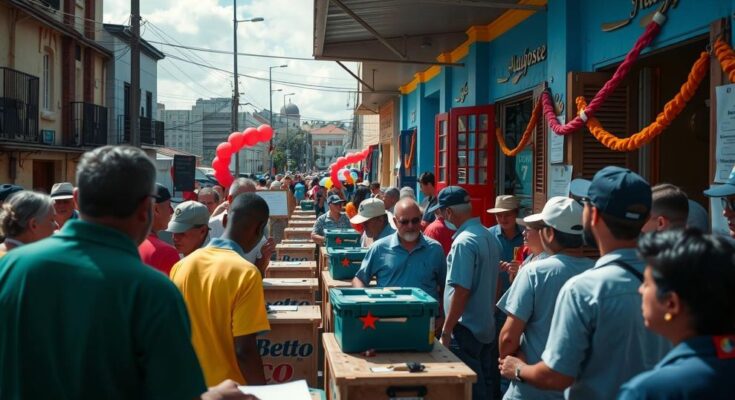Puerto Rico is holding a significant general election with potential historical implications, featuring gubernatorial candidates from the New Progressive Party, the Independence Party, and emerging political movements. High voter engagement reflects a desire for change amidst social and economic challenges. This election is accompanied by a nonbinding referendum on Puerto Rico’s political status with the U.S., amid concerns over electoral processes and delays in results.
Puerto Rico is currently undergoing a pivotal general election that is poised to bring significant change to its political landscape. On the ballot are gubernatorial candidates Jenniffer González of the New Progressive Party (NPP), Juan Dalmau representing the Independence Party and Citizen Victory Movement, along with Jesús Manuel Ortiz from the Popular Democratic Party and Javier Jiménez of Project Dignity. This election marks a potential turning point, as a victory for González would signify a historic third consecutive term for the NPP, while a win for Dalmau would be unprecedented for a candidate outside the traditional two-party system that has long dominated the island’s politics. Voter engagement is notably high, with many citizens expressing a desire for real change amidst economic and social challenges. The long lines at polling stations exemplify this growing frustration and demand for transformation, particularly concerning issues such as power outages and affordable housing. Among the engaged voters is renowned artist Bad Bunny, who has openly criticized the pro-statehood party and has urged Puerto Ricans to choose wisely for their future. Additionally, voters will have the opportunity to participate in a nonbinding referendum regarding Puerto Rico’s political status, with options including statehood and independence. This reflects an ongoing conversation about the island’s relationship with the United States. Results from the election may be delayed, with officials still counting early and absentee votes amid reports of electoral irregularities, emphasizing the complexities involved in the electoral process.
The political history of Puerto Rico has been dominated by the New Progressive Party (NPP) and the Popular Democratic Party (PDP). For decades, these parties have secured significant percentages of the vote. However, discontent with political conditions and challenges, such as economic instability and chronic power outages, have prompted the rise of alternative parties. This election marks a critical moment where citizens can redefine the political landscape of Puerto Rico, as both electoral participation and interest in newer parties have notably increased since 2016. This context frames the current electoral climate as unique and potentially transformative for the island’s governance and future direction.
In conclusion, Puerto Rico’s current general election represents a historic opportunity for change. The potential outcomes of this election could redefine the political landscape, either through the continuation of historical dominance by the NPP or the emergence of new political narratives led by candidates like Juan Dalmau. Voter turnout and future engagement will significantly determine the route Puerto Rico takes regarding its governance and political status. As citizens express their desire for real change, this election serves as a crucial moment in the island’s political history.
Original Source: apnews.com




